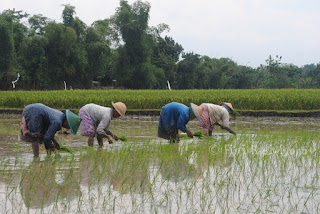[Transcript] Interview with Former Minister Chatib Basri and Mari Elka Pangestu on Indonesia’s Economic Future
The Interview is Taken by: Australia –
Indonesia Center, Indonesia Project and Australian National University
Transcribed by: Indra Gunawan (27/6/18)
---------------------------------------------------
Opening
by Helen Brown (interviewer):
So we are here in Canberra, and we are
about to catch up with Mari Pangestu, a former ministry of trade and also
tourism and the creative economy of Indonesia and former finance minister
Chatib Basri. These two are also well-known economists, we really came to talk
to them about innovation between Australia and Indonesia, why it’s so important
and also why it’s so important now at this point in the economics of both countries.
Chatib Basri and Mari Pangestu are also co-conveners of the ANU-Indonesia
Update[1] where we can find out more every year about what’s actually happening in
Indonesia.
Helen Brown : I just perhaps start with your part.
Could you [..] to me the economic situation for Indonesia at the moment?
Chatib Basri : Well, I think I would say that Indonesian
economy is at the cross road at this moment because the resource booming is
over. And we cannot continue to maintain the cheap labor strategy because we cannot
compete with Bangladesh because their wages is only 1/3 compare to us. So the
only way move into the next stage is to improve the quality of human capital
and also supported by the innovation and if you look at our export, 60% is
mostly energy and commodity-related, so the role of this innovation, the
R&D will become a very important for the future.
Mari Elka : Ya, ya. I mean that’s definitely where we
are now, cross-road, right. Diversify the economy from commodity-based economy
and we recognize that we have to go to the next stage of our economic
development. So it’s also not just industrialization, export-oriented
industrialization as of the past. I think we need to address, modernizing our
services sector and that includes tourism that includes the modern services
that will make us more efficient - the whole economy more efficient and it’s
also about innovation and creativity. And this is actually an area where, you
know, with Australia, given what I know, I’ve been following the Indonesia –
Australia CEPA Negotiations[2], I think one area that has been identified is
actually vocational education, capacity building – vocational education, so
like what he said we need to build that part human capital. The skill-based is
gonna be needed for an innovation creative-based economy, is going to be
different from the past. Plus the fact that we have this huge transformation of
technology that can be an opportunity but it also has a downside if we can’t
bring the people along.
Helen Brown : The president is focusing on tourism as one of the area [..]
that you mention than your former tourism minister. How important is it do you
think that a country like Australia collaborate with Indonesia at this point,
you call it as critical point, how important is it to collaborate right now on
helping with that vision do you [..]
Mari Elka : I think, I would say we are two great
countries which are neighbors to each other but yet the economic interaction
between us is so low, you know. And we are big country, we have a huge domestic
market, so it’s more actually “why is Australia not so engage with Indonesia?” a
kind of question. And I think that’s actually where we should see the
opportunity for Australia-Indonesia to cooperate, not just in the bilateral
[sense], but how we can actually make each other more innovative, more
competitive to service the regional market, not just the bilateral aspect.
So I think
on tourism, let’s just put it on human capital as a beginning, I think besides
tourism, I always thought health and education are two other sectors that
Indonesia and Australia can really benefit from each other. And this is
actually a sort of thinking ahead that’s probably that also the two areas. Yeah,
the president is also very concern about health and education. So I think it
can be combined very nicely. And tourism, to me, is always really linked to
creative economy. It’s your film industry, it’s your all these creative
industries that are actually Indonesian-based, sorry, Australia-based, that are
[these] work platforms, one is called 1999 design, and one is called freelance
which are Australian-based and which Indonesian designers are actually a member
of this platform, so it’s already happening despite what the government does
and does not do.
Chatib Basri : And if I may add, I completely agree
with Mari regarding this, you know, education and health. Because if you look
at Indonesia, one of the our potentials is about the young population and also
the rising middle class. And it’s typical of country with the rising middle
class, they are talking especially about the good quality of education also
about health. So I think both countries; Indonesia and Australia, if we can
work together on those two issues, that would be very useful to both countries.
Helen Brown : As we heard, the [..] presidential election
coming up, we’ve got a slowing growth [..] at the certain point. That [back]
the question is “Do you think Indonesia will be opened to innovation and change
and things which are little bit difficult, or will be a little bit more tricky
to implement this thing at this point?”
Chatib Basri : Well, first of all, I have to say that 5 percent is not bad at all compared to
American simply [..] to this area. And for the second one, like it or not, it
is inevitable that we have to move into the need for innovation. Because we
cannot continue to, you know, keep our economy like only on the resource-based,
ya. So, I think despite all this process is not always easy, but definitely we
need to move into that direction.
Mari Elka : Well, if I could add, I think, you know, we
have become a sort of if you like a normal country, that, you know leading [..]
to election [since] always difficult time to use up your political capital to
undertaken your bold reforms. And so I think we can just sort of think about
how we can actually push for reforms in that kind of world. And I think one
answer which has already been talked about within government and also been
suggested is to have special economic zones. So if you are not ready to open up
your education and health sector quite yet, maybe you can do it in special
economic zones which can be more open than the general policy. So I think that
one possible direction whether it happens before 2019 or not, that’s something
we hope will at least start.
And I do
think that in areas like tourism, there is less resistant side, I guess.
Because in the result of the survey that will be presented later today, it
actually shows that Indonesians while they are maybe little bit anti foreign in
terms of workers, import products, foreign investments, they are actually very
welcoming for foreign [literatures]. So, and I think Australians obviously have
an affinity to come to Indonesia. So, that maybe an area where we can really
push a lot of cooperation. I think 40% of our cruise ship tourism comes [..]
Australia, so that’s already, you know, happening and we can do more and maybe
what they call holiday work, is that, ya? So you can actually come here for
extended period on holiday but also work and vice versa for Australia, young
Australians to come to Indonesia to work. I think those would be good areas to
work hard.
Chatib Basri : [..] I think if I may add on tourism,
I think the benefit is immediate for people of Indonesia. And if you look at
the stages of the relationship between countries they start with the tourism,
and then trade, and then late [..] will be investment. So if we can start with
the tourism, that would be something great.
Helen Brown : And it is [fun] [..] it is called [..] Indonesia update, you
both help convenience. Why it is so important to have this event every year?
Mari Elka : I think it’s really great way for many
reasons; one is to really go in-depth into particular issues to get an
understanding and analysis. And the most important is to understand “Ok what
should be the right thing to do?” or “What should be the recommendation going
forward on that particular issue?”, and you know this particular update, we are
focusing on the new [normal], the new world, which is so much uncertainty, so
many questions to be asked. So I think it is very timely, and I do think this
helps actually increase Australia’s understanding about Indonesia in in-depth
way. And somebody actually mentioned “Maybe we should have an Australia update
in Indonesia”, our ambassador was just saying that.
Helen Brown : Would you like to say that pak Chatib?
Chatib Basri : Ya, ya. And I think if I may add one another
point is; this is not unique for Indonesia. This new trend, we are talking
about this trend of this rising economic nationalism, you know, the issue of
sovereignties, happening in many countries in the world, not only in
Indonesian. We need to go into, you know, in-depth [..] to get to know about
what’s the reasons behind it. And off course, you know, if you are talking
about the Australia update, you probably need to have this socially update in Indonesia.



Comments
Post a Comment